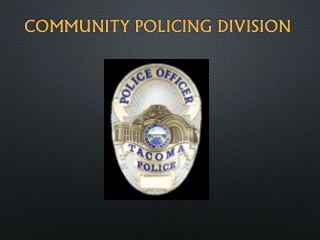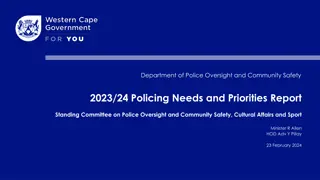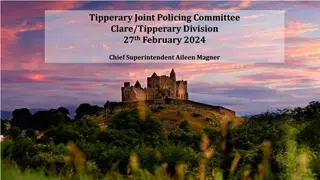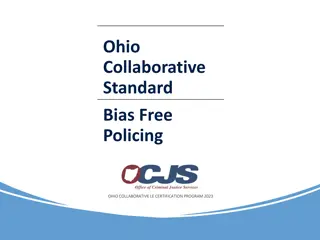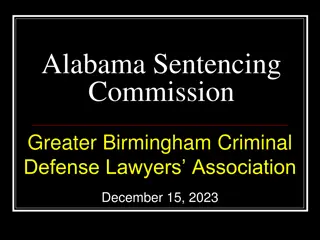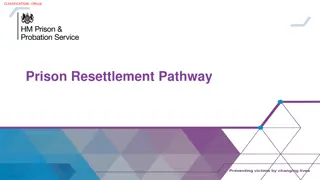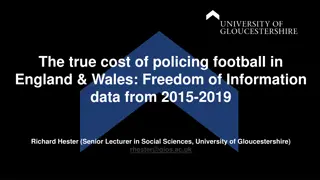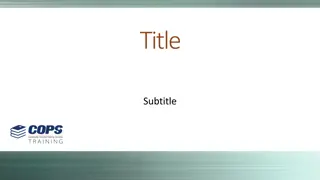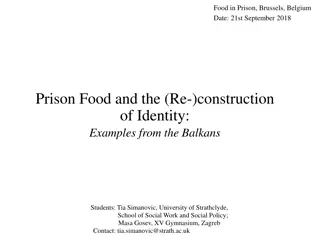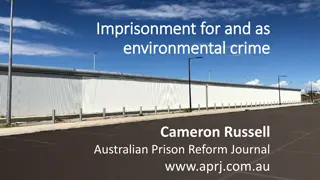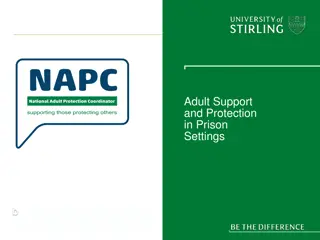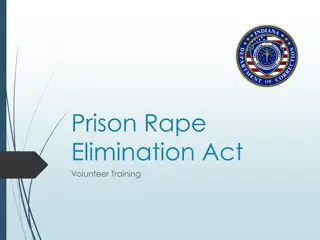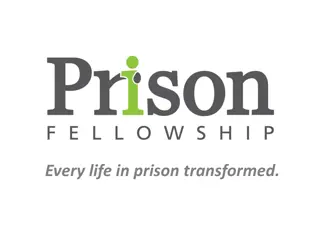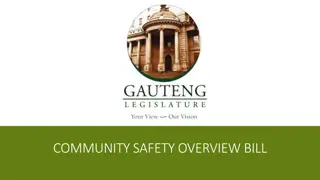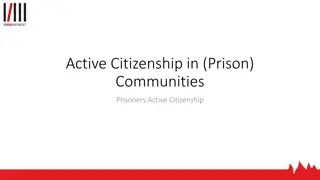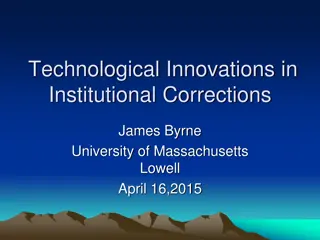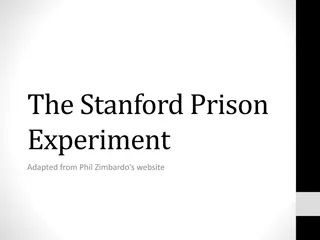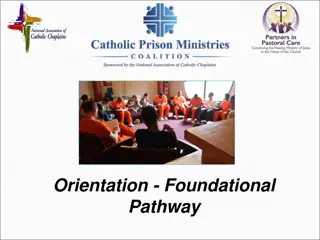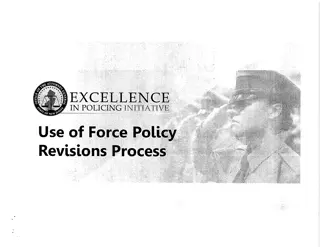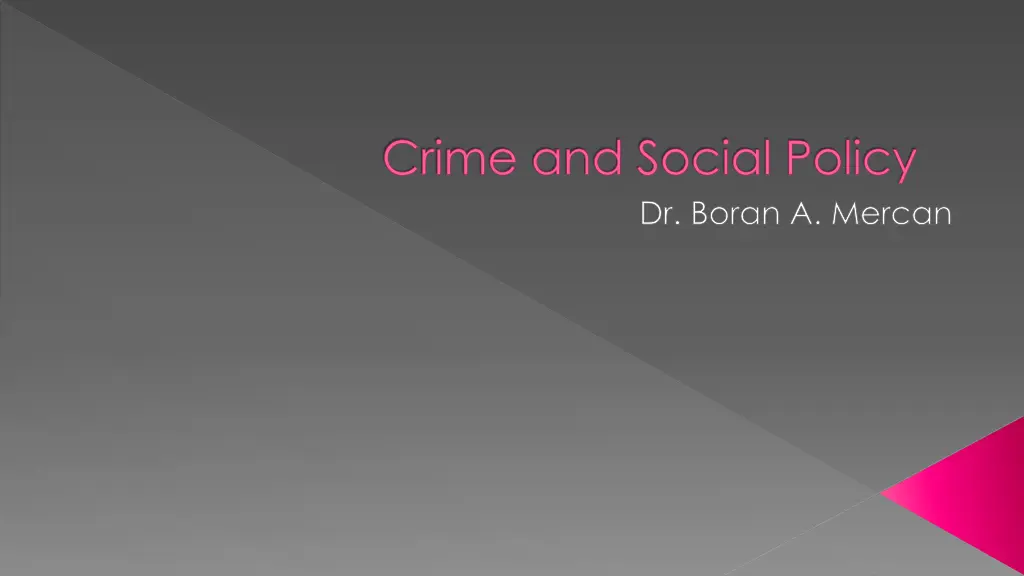
Understanding the Role of Police in Social Policy and Security
Explore the multifaceted role of the police in society, from maintaining social order to enforcing regulations. Delve into the origins of policing, the concept of governmentality, and the implications of police work on crime prevention. Learn how the police function as an apparatus of the state, focusing on security, territory, and population according to Michel Foucault's theories.
Download Presentation

Please find below an Image/Link to download the presentation.
The content on the website is provided AS IS for your information and personal use only. It may not be sold, licensed, or shared on other websites without obtaining consent from the author. If you encounter any issues during the download, it is possible that the publisher has removed the file from their server.
You are allowed to download the files provided on this website for personal or commercial use, subject to the condition that they are used lawfully. All files are the property of their respective owners.
The content on the website is provided AS IS for your information and personal use only. It may not be sold, licensed, or shared on other websites without obtaining consent from the author.
E N D
Presentation Transcript
Crime and Social Policy Dr. Boran A. Mercan
Policing, Prison and Imprisonment what it is that the police do? the issues of policing Ensuring social order and the role of police Governmentality
Police officers, according to the mainstream approach, keeping the peace officer , This means the police is not directly to do with keeping the law , so empirically spending less time enforcing the law than otherwise might be. The functional definitions of police work come on the agenda of criminology. The maintenance of order is an actual concern.
What do the Police do? The security of person and property, the preservation of the public tranquillity, and all other objects of a police establishment will thus be better effected than by the detection and punishment of the offender after he has succeeded in committing the crime. This should be constantly kept in mind by every member of the police force, as the guide for his own conduct. Officers and police constables should endeavour to distinguish themselves by such vigilance and activity as may render it impossible for any one to commit a crime within that portion of the town under their charge (The Metropolitan Police s first instruction book)
We need to return back to Michel Foucault Security, Territory and Population, Lectures at the Coll ge de France between 1977 and 1978
Police is the apparatus (technological assemblage) that makes reason of state function the set of means by which the state s forces can be increased while preserving the state in good order. (Foucault, Security, Territory, Population)
Police is the laws and regulations that concern the interior of a state and which endeavour to strengthen and increase the power of this state and make good use of its forces. (J.H.G. von Justi, l ments g n raux de police)
Population size (relative to territory, resource, economy) Provision of the necessities of life (food, clothing, shelter, etc.) Provision of health (epidemics and everyday health) Regulation of activity (prevention of idleness, regulation of professions, etc.) Circulation of things and people
Fabrication of Order - Born of security apparatuses - Right-hand of the state - Governmentality and policing
Neocleus (2000): Police Begets Good Order Mastering the masterless; imposing order Mastering the market, imposing work and policing the poor The means of regulation and surveillance of the working-class Social police
Neocleus (2000) Ordering Insecurity: The fabrication of wage labour Social classes, criminals and relief recipients 19th Poor Law Medical police Towards the legal reconstruction of policing practices
Modern policing: How modern? And What is modern? Plural policing (Loader, 2000) Not the matter of the state, but the democratic regulation of social control an attempt to critique policing by searching a democratic public good in and through governance, We re in the age of neo-liberal order and security
Segregation and unification techniques at work New categories of risk and dangerous population Hyper-ghettos containing massive African-American most precarious section of the working-class; Black-belt Even in Europe, the zero-tolerance policy being transferred from the US France Red-belt Deproleterianisation, workfare, prisonfare, spatial relegation, the deterioration and demarcation of symbolic collective hope to survive.... L.J. Wacquant: Urban Outcasts (2008) and Punishing the Poor (2009)
The emergence of the prison as the modern system of punishment - Discipline and Punish: The Birth of the Prison(Foucault, 1977) - The idea of Panopticon - Regulation of bodies and internalisation of surveillance
D&P focuses on the language through which we know and make sense of the world (archaeology) and reveals the role of power that changes it (genealogy). D&P presents a history of the present (Nietzsche) The aim of such a history is to understand and evaluate present rules, practices and institutions like prison. Foucault helps us dislocate the notion of historical progress and civilisation the transition from vengeance to rehabilitation or more medical forms
A historical transformation from torture to detention Torture was the main form of punishment Painful the interrogation and public torture (Robert Damiens in D&P) Principles of Utility (Bentham) Three elements appear in the logic of torture: - the infliction of a measured amount of pain; - the regulation of that pain; - and the ritualistic character of the application of techniques producing pain What is the rationale of this punishment?: - the king, as the sovereign body, - He uses sovereignty
the18thcentury humanism: a group of reformers sought to change the form and content of punishment Penalties to be regulated, proportioned and even abolished wherever they go against humanity New logic of punishment emerged. Punishment should regain the offender back in society and be corrective to pain inflicted on individuals or society So punishment must be efficient, effective and humane
Discipline is basically the mechanism of power through which we come to control the social body in its finest elements, through which we arrive at the very atoms of society, which is to say individuals [ ] How to oversee someone, how to control their conduct, their behaviour, their aptitudes, how to intensify their performance, multiply their capacities, how to put them in the place where they will be most useful: this is what discipline is, in my sense (M. Foucault, The Meshes of Power , p. 159)
The birth of the prison was the emergence of detention as a preventive form The prison was the main form of punishment The punishment in the form of prison both incorporates and contradicts the ideas and aims of humanist reformers Public torture is no longer important because the aim is to modify behaviour. A single defined punishment for all crimes instead of arbitrarily matching punishment to crime.
the birth of prison is merely the birth of a disciplinary society Some dimension of discipline can be identified: - hierarchical observation, - normalising judgment, - Examination Panopticon by Bentham (1791) The birth of prison complex with all carceral agents and institutions: social workers, psychologists, psychiatrists, judges, family doctors, personal counsellors, the legal system, and so forth
how prison policy has changed in recent decades in the West? - The Anglo-American case who is incarcerated in prison? - The intersection of social and criminal justice - Assistantial-carceral net (Wacquant, 2009) - Swollen population of inmates - New roles and functions of the prison
Prison functions as a satellite of hyperghettos Containment of massive wage-labour population Ethno-racial and socio-economic, multidimensional means of control Huge numbers of inmate population in the US Neo-liberal governmental technology to keep deproleterianised population within workfare The emergence of prisonfare Social & criminal justice (worfare + prisonfare)

